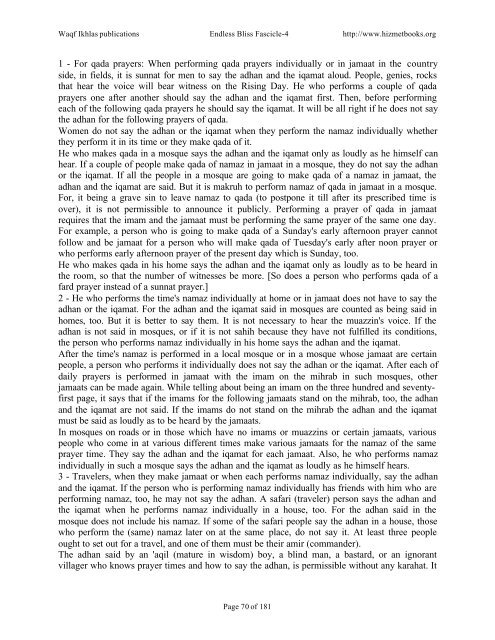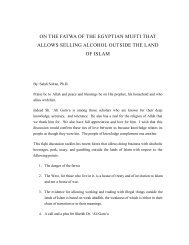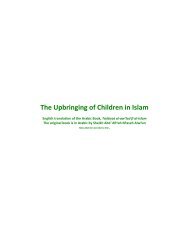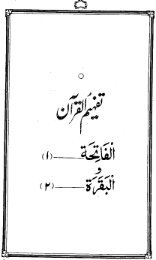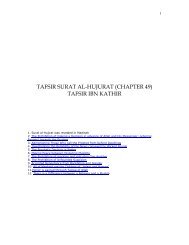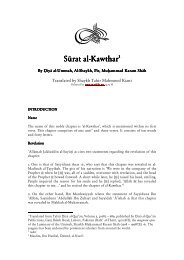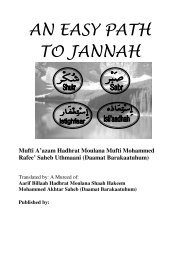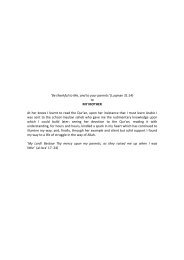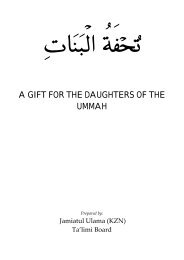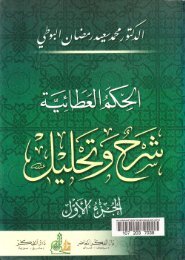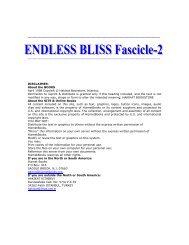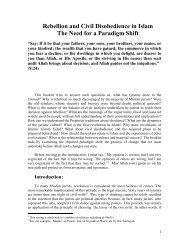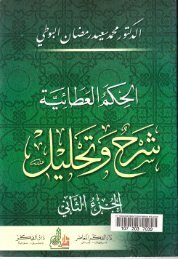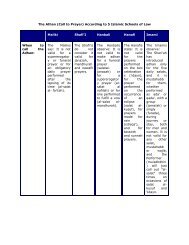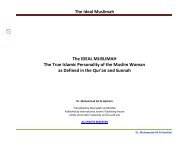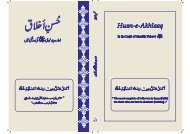ENDLESS BLISS FASCICLE-4
ENDLESS BLISS FASCICLE-4
ENDLESS BLISS FASCICLE-4
You also want an ePaper? Increase the reach of your titles
YUMPU automatically turns print PDFs into web optimized ePapers that Google loves.
Waqf Ikhlas publications Endless Bliss Fascicle-4 http://www.hizmetbooks.org<br />
1 - For qada prayers: When performing qada prayers individually or in jamaat in the country<br />
side, in fields, it is sunnat for men to say the adhan and the iqamat aloud. People, genies, rocks<br />
that hear the voice will bear witness on the Rising Day. He who performs a couple of qada<br />
prayers one after another should say the adhan and the iqamat first. Then, before performing<br />
each of the following qada prayers he should say the iqamat. It will be all right if he does not say<br />
the adhan for the following prayers of qada.<br />
Women do not say the adhan or the iqamat when they perform the namaz individually whether<br />
they perform it in its time or they make qada of it.<br />
He who makes qada in a mosque says the adhan and the iqamat only as loudly as he himself can<br />
hear. If a couple of people make qada of namaz in jamaat in a mosque, they do not say the adhan<br />
or the iqamat. If all the people in a mosque are going to make qada of a namaz in jamaat, the<br />
adhan and the iqamat are said. But it is makruh to perform namaz of qada in jamaat in a mosque.<br />
For, it being a grave sin to leave namaz to qada (to postpone it till after its prescribed time is<br />
over), it is not permissible to announce it publicly. Performing a prayer of qada in jamaat<br />
requires that the imam and the jamaat must be performing the same prayer of the same one day.<br />
For example, a person who is going to make qada of a Sunday's early afternoon prayer cannot<br />
follow and be jamaat for a person who will make qada of Tuesday's early after noon prayer or<br />
who performs early afternoon prayer of the present day which is Sunday, too.<br />
He who makes qada in his home says the adhan and the iqamat only as loudly as to be heard in<br />
the room, so that the number of witnesses be more. [So does a person who performs qada of a<br />
fard prayer instead of a sunnat prayer.]<br />
2 - He who performs the time's namaz individually at home or in jamaat does not have to say the<br />
adhan or the iqamat. For the adhan and the iqamat said in mosques are counted as being said in<br />
homes, too. But it is better to say them. It is not necessary to hear the muazzin's voice. If the<br />
adhan is not said in mosques, or if it is not sahih because they have not fulfilled its conditions,<br />
the person who performs namaz individually in his home says the adhan and the iqamat.<br />
After the time's namaz is performed in a local mosque or in a mosque whose jamaat are certain<br />
people, a person who performs it individually does not say the adhan or the iqamat. After each of<br />
daily prayers is performed in jamaat with the imam on the mihrab in such mosques, other<br />
jamaats can be made again. While telling about being an imam on the three hundred and seventyfirst<br />
page, it says that if the imams for the following jamaats stand on the mihrab, too, the adhan<br />
and the iqamat are not said. If the imams do not stand on the mihrab the adhan and the iqamat<br />
must be said as loudly as to be heard by the jamaats.<br />
In mosques on roads or in those which have no imams or muazzins or certain jamaats, various<br />
people who come in at various different times make various jamaats for the namaz of the same<br />
prayer time. They say the adhan and the iqamat for each jamaat. Also, he who performs namaz<br />
individually in such a mosque says the adhan and the iqamat as loudly as he himself hears.<br />
3 - Travelers, when they make jamaat or when each performs namaz individually, say the adhan<br />
and the iqamat. If the person who is performing namaz individually has friends with him who are<br />
performing namaz, too, he may not say the adhan. A safari (traveler) person says the adhan and<br />
the iqamat when he performs namaz individually in a house, too. For the adhan said in the<br />
mosque does not include his namaz. If some of the safari people say the adhan in a house, those<br />
who perform the (same) namaz later on at the same place, do not say it. At least three people<br />
ought to set out for a travel, and one of them must be their amir (commander).<br />
The adhan said by an 'aqil (mature in wisdom) boy, a blind man, a bastard, or an ignorant<br />
villager who knows prayer times and how to say the adhan, is permissible without any karahat. It<br />
Page 70 of 181


